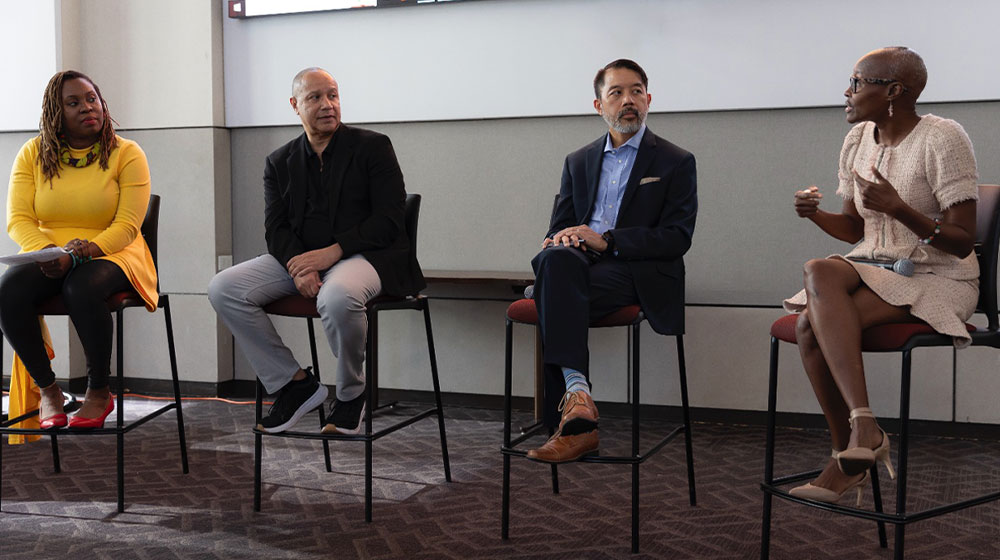Everyone to Their Fullest Potential

On June 5, the Baumhart Center held “Everyone to their Fullest Potential - The Future of DEI,” with esteemed leaders from legal, nonprofit, and for-profit sectors who discussed how we can truly create diverse, equitable, and inclusive environments. The panel focused on how DEI is critically important to sustaining organizations.
Our esteemed panelists shared invaluable insights during the event.
- Robert Perkins, SVP, Chief Global Diversity and Inclusion Officer, Mondelez International
- Chipo Byambuya, Esq., Managing Partner and Co-Founder, CZL P.C.
- Chris Martinez, Chief Administration and Strategy Officer, The Resurrection Project and Leading For DEI Class of ’23
- Carla Madeleine Kupe, Esq., Managing Partner and Co-Founder, CZL P.C., and Lead Facilitator, Leading For DEI
“A good leader figures out how to manage those generational differences... our leadership matters. We have to coach our leaders on how you do this in the right way.”
Robert Perkins, SVP, Chief Global Diversity and Inclusion Officer
Mondelez International
The conversation started with grounding the audience on what DEI is and why it is important for organizations. Business leaders care about their company’s performance, and employees want to feel represented. When leadership makes all employees feel valued, it increases recruitment, engagement, productivity, and retention.
“You can use data to create the narrative that you want to communicate.”
Chipo Nyambuya, Esq., Managing Partner and Co-Founder
CZL P.C.
Next, the discussion focused on how to get leadership buy-in by appealing to what matters to them: running an effective company. Using quantitative research, backed by qualitative information, is an effective method to achieve this.
“The way I’ve learned to be comfortable in my own skin is to not just model authenticity, but encourage it, and provide a safe and welcoming environment for my team members and our staff.”
Chris Martinez, Chief Administrator and Strategy Officer
The Resurrection Project and Leading For DEI Class of ‘23
The conversation then shifted to dispelling some misconceptions about DEI and highlighted the legal impacts of engaging in, or choosing not to engage in, DEI-focused work, with perspectives from both sides. The best way for an organization to show it appreciates its people is by consistently exemplifying its values.
“At the end of the day it doesn’t matter what you call it—your mission, your purpose, doesn’t change.”
Carla Madeleine Kupe, Esq., Managing Partner and Co-Founder, CZL P.C., Lead Facilitator, Leading For DEI
The event concluded with insightful questions from the audience about how they can implement these concepts into their organizations.
Key Takeaways
- Engage all employees in the process.
- You do not have to be in authority to have influence.
- Whether you call it DEI, Affirmative Action, Anti-Racism work, etc… do not focus on the name; focus on its purpose.
- Find out how leadership reacts, find the right data, and develop the narrative to support your business case.
- DEI is bigger than race, gender, sexual orientation, and other things... it is about valuing people.
Apply now for Leading for DEI
Leading for DEI engages leaders to explore how DEI can enhance each business function—from human resources to supply chain to executive governance—and add social, financial, and societal value. The program is delivered through a unique partnership between the Institute for Racial Justice and the Baumhart Center. Learn more and apply.
